Candidates Came Together in Their Televisual Space and, Finally, Campaigned
- Share via
How did democracy do in the first debate between George Bush and Michael S. Dukakis?
Well, there is good news and bad news. The bad news is that neither candidate advanced any new or particularly insightful ideas about the nation’s problems. Nor did they have the courage to say anything that the electorate may not be willing to hear, for neither believes in leadership of that sort.
These discouraging results are consistent with the overall tenor of the campaign. By now electioneering has reached a kind of pathetic equilibrium. Each day the two camps target their audiences and plot to control the coverage on the evening news. But the evening news is increasingly about this targeting and plotting. The result is that viewers learn little that they can use as voters. The “information” that Dukakis is trying to appeal to Reagan Democrats, or that Bush is attempting to woo women voters, is utterly ambiguous.
Should Democrats who voted for Ronald Reagan be impressed by the fact that Dukakis wants to appeal to them? Or should they dismiss his strategy as just a cheap election-year ploy? Should Bush win points among women for his effort to woo them? Or should they reject his wooing as too little and too late?
Reporters and editors are aware of the charge that they focus too often on the horse-race angle in their coverage. But they are not as aware of the corrosive effect that such coverage can have on democratic values. News about the latest moves of two media-savvy candidates teaches us that neither man has any real beliefs and that the campaign is not about anything but winning. Journalists who think this way are lacking in self-respect. They forget what makes their profession a special one in a democracy: the belief--not just the fact, but the belief--that citizens will make intelligent choices if presented with the information necessary to do so. To advance this belief (against the evidence that is always available to refute it) is an idealistic act, and the press needs an organizing ideal beyond an insistence on its own freedom. Freedom to do what? That is the relevant question, and surely the answer must be to uphold the democratic values of informed, honest and rational discussion.
The candidates must also feel a duty to these values, but if they do not the press cannot afford to simply report their machinations. For its own sake as well as ours, the press must behave as if ideas mattered, as if voters were ready to read and listen and think about their common problems. The polls may show how little most Americans know about the issues, the candidates may demonstrate how little they want to discuss them, but when our journalists resign themselves to these facts they encourage the worst instincts in everyone. The candidates continue to say whatever will get them elected, regardless of the truth, and voters continue to assume that all politicians are shallow and corrupt, interested only in votes. This is the crime of the horse-race approach to reporting: It encourages the emptying out of public life by the cynical values of the marketplace, where anything goes as long as it sells.
Under these conditions, it is remarkable that so many people watched the debate on Sunday--by some estimates, 100 million Americans. One can almost detect a hunger for debate among the voters, and this in itself is good news. But there was more. For the first time in the campaign, Bush and Dukakis occupied the same televisual space. Standing side by side at their lecterns, they occasionally turned and addressed each other directly--a powerful image of the clash of competing views. Behind them no flags waved, no bands played, no banners stretched and no aides stood ready to applaud at every applause line. Alone on the stage, the candidates were left with nothing but their arguments and their eloquence. This spare imagery reinforced the moral principle underlying the debate--in a democracy we discuss our differences and have a duty to that discussion that goes beyond winning and losing. Our duty as citizens, leaders and journalists is to make debate matter.
For all their timidity and evasiveness, Bush and Dukakis did their duty by facing each other and trying to put forward logical arguments in defense of their positions. They have a long way to go--we have a long way to go--in creating an environment in which problems like the budget deficit can be honestly addressed. But no one can dismiss as mere gesture the step that they took Sunday into a space where arguments matter. Nor should we overlook the contribution that the panel of journalists made to the evening. Their questions were not about this week’s strategy or the findings in the latest polls. They were about the issues, and they carried with them an appeal to the vital principles of logical consistency and informed debate.
For 90 minutes the horse race was suspended and we were once again permitted to believe that politics is about more than winning elections. This belief is a precious thing in a democracy. That television can sometimes sustain it is an encouraging sign in an otherwise dreary campaign.
More to Read
Get the L.A. Times Politics newsletter
Deeply reported insights into legislation, politics and policy from Sacramento, Washington and beyond. In your inbox twice per week.
You may occasionally receive promotional content from the Los Angeles Times.










